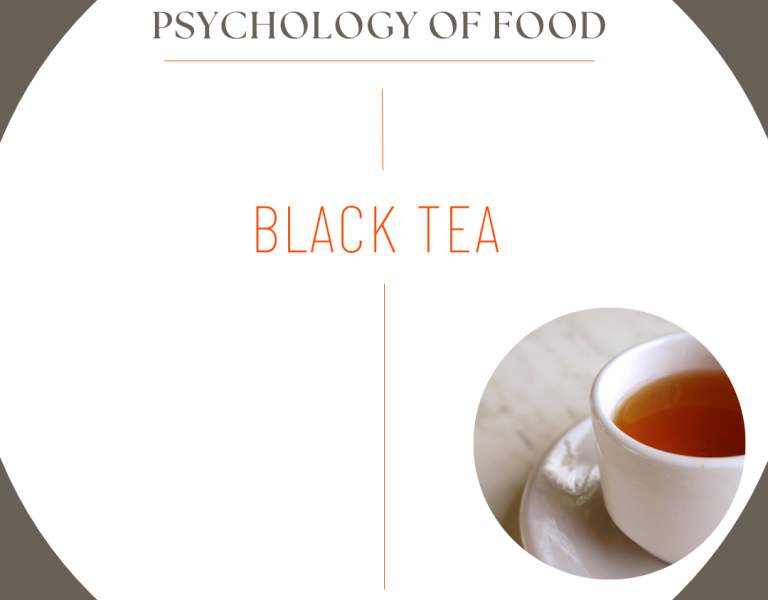
Insights Series: Healing Power of Food: Black Tea.
I am excited to introduce my new Social Media series, created in the spirit of my Food & Nutrition Coaching studies at the Nature Care College. During the first term, I learned a lot of incredible information about nutrition and the intriguing topic Psychology of Food. The second term included the unit Food as Medicine, another fascinating subject which I will also draw on for this series. If you are interested in learning more, please join me on Instagram or Facebook.
What is Psychology of Food?
Psychology of Food is an introduction to Neuro-Gastro-Enterology i.e. the study of how:
- Our gut and brain are interconnected and influence each other;
- The food we eat influences us, our system including our moods.
This is not new, in fact the saying ‘One man’s food is another man’s poison.’ has been around since BC (!) - it is attributed to either Lucretius or Hippocrates.
In focus today - Black Tea (from the Camellia sinensis plant).
Why did I choose Black Tea as the first topic for this new series? Personally, Black Tea was never my tea of choice - until I’ve learned about some of the amazing health benefits. Various studies have been done with some interesting findings, here are my key call out’s.
Black Tea:
- Contains powerful antioxidants and other compounds including polyphenols and flavonoids which potentially decrease inflammation and reduce risk for onset chronic disorders
- Natural source of L Theanine, an unique amino acid that can help to reduce cortisol levels, reduce mild anxiety, enhance sleep – it is also good for brain function, concentration & focus
- Shown to increase Alpha 1 waves which support relaxation and alertness
- Contains Theobromine - Greek word Theobroma means ‘ foods of gods’ - a bitter alkaloid stimulant (similar to caffeine) used to treat hypertension, asthma or cardio-vascular disease
- Improves blood pressure and endothelial tone (cells involved with lining of our blood and lymph vessels including the heart) and supports healthy cholesterol levels
- 2-3 cups daily are associated with higher spinal bone density, lower risk of cardio-vascular disease, stroke and cognitive impairment
- 4 cups daily or more are associated with higher total bone mineral density (it makes bones stronger yet it may or may not protect against fracture)
- Plays a role in reducing body weight due to polyphenols which suppress digestion and absorption of fats and complex sugars
- Decreases blood glucose, improves the status of insulin hormone and the body’s ability to metabolise sugar
What’s not to love about this?!
Discussions of the results from some studies have shown that drinking three cups per day significantly improved the antioxidant status of the body and no credible evidence was found by them that showed black tea is harmful (Gardner EJ, Ruxton CH, Leeds AR. Black tea helpful or harmful? A review of the evidence. Eur J Clin Nutr. 2007;61:3–18) 1
A word of caution.
- Black tea contains caffeine and although it is less per cup than coffee, if you drink several cups of tea a day, it will add up
- This article and ongoing posts on my Social Media channels are intended for educational purposes and not deemed as advice
- As always, listen to your body and conduct further research to ensure this is right for you or consult with your GP or relevant healthcare professional.
I have now added black tea to my tea portfolio which includes white, green and herbal teas. Regardless of what type of tea it is, to me there is nothing more relaxing and soothing than brewing a cup or a pot of tea – I see it as a welcome break from the busyness and to do’s; it is my idea of bringing myself into the present and enjoying the moment.
Happy tea-time,
Lexi
“A cup of tea is a cup of peace.”
~Sen Sōshitsu XV~
Sources:
- Full content credit goes to the Nature Care College via the Learning Guide and the excellent lectures by our tutor Fiona (who practices as a naturopath)
- For more detailed information on some of the key call out’s and item 1, refer to this publication by Rasheed Z. Molecular evidences of health benefits of drinking black tea. Int J Health Sci (Qassim). 2019 May-Jun;13(3):1-3. PMID: 31123432; PMCID: PMC6512146 or use this link https://www.ncbi.nlm.nih.gov/pmc/articles/PMC6512146/
Related article in this series - click on link to read:











